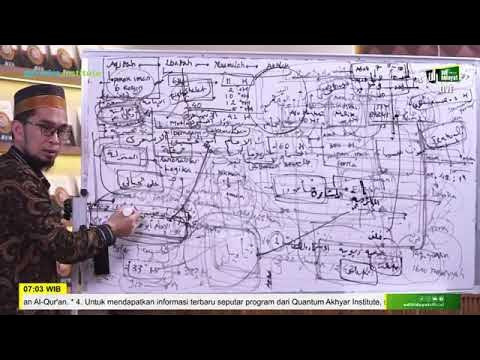SEJARAH SINGKAT PMII DARI MASA KE MASA
Summary
TLDRThe Indonesian Muslim Student Movement (PMI), founded in 1960, is an organization rooted in Nahdlatul Ulama, aimed at promoting Ahlussunnah Wal Jamaah values among students. Initially formed by 13 NU students, PMI has grown to become a significant force in both national and international forums. Over the years, it has maintained its commitment to upholding the principles of Islam, justice, equality, and peace. The organization emphasizes the development of a Muslim Indonesian identity that is dedicated to education, morality, and the pursuit of national independence. With 17 leadership transitions since its inception, PMI continues to evolve, with a focus on modernization and global outreach.
Takeaways
- 😀 The Indonesian Islamic Student Movement (PMI) was founded on April 17, 1960, in Surabaya by 13 NU (Nahdlatul Ulama) students from various regions.
- 😀 PMI's foundation aimed to provide a platform for NU students to express their aspirations, develop their potential, and uphold the values of Ahlussunnah Waljama'ah.
- 😀 PMI has been a strategic tool for NU's cadre development across Indonesia, influencing various student activities with its core values of Ahlussunnah Waljama'ah and Pancasila.
- 😀 Since its inception, PMI has played a key role in Indonesian national and international forums, championing social change and Islamic values.
- 😀 The first PMI congress in December 1961 in Tawangmangu led to the establishment of 13 PMI branches across Indonesia.
- 😀 PMI emphasized its commitment to supporting the Indonesian people, shown through its support for the Yogyakarta Declaration during its second congress.
- 😀 On April 14, 1972, PMI declared its independence in Murnajati, Malang, asserting its political stance free from external party influences during the New Order regime.
- 😀 The independence of PMI was reaffirmed in 1989 through the Cibogo Declaration, emphasizing the importance of upholding Islamic teachings and moral values.
- 😀 PMI has consistently advocated for the rights and welfare of the people, focusing on values such as equality, justice, tolerance, and peace.
- 😀 Over the years, PMI has been led by 17 different chairpersons, with its leadership continuing to evolve under prominent figures such as Mahbub Djunaedi, Muhammad Zamroni, and Muhammad Abdullah Syukri.
Q & A
What is the origin of the Indonesian Muslim Student Movement (PMI)?
-The Indonesian Muslim Student Movement (PMI) was founded on April 17, 1960, in Surabaya, at the Madrasah Mu'allimin building, by 13 students from the Nahdlatul Ulama (NU).
What was the purpose of establishing the PMI?
-PMI was established due to the strong desire among young NU intellectuals to create an independent student organization that would serve as a platform for expressing aspirations, developing potential, and reflecting the values of Ahlussunnah Waljamaah in student movements.
How did PMI contribute to Indonesian society after its founding?
-PMI played a significant role in shaping social change, contributing to various national and international forums, and advocating for the values of Ahlussunnah Waljamaah and Pancasila.
What is the significance of the 1972 Murnajati Declaration?
-The 1972 Murnajati Declaration marked PMI's political independence, asserting that the organization would not be influenced by the political dynamics of the New Order regime. It emphasized PMI's commitment to uphold Islamic values and ideals of justice and morality.
What core values does PMI emphasize in its mission?
-PMI emphasizes the core values of Ahlussunnah Waljamaah, justice, equality, tolerance, peace, and commitment to advancing the moral and spiritual development of its members.
How has PMI evolved over the years in terms of leadership?
-Since its establishment, PMI has been led by 17 different chairpersons, each contributing to the growth and transformation of the organization. Leadership has ranged from Mahbub Djunaedi in 1960 to Muhammad Abdullah Syukri in 2021.
What role did PMI play in student movements during the New Order era?
-During the New Order era, PMI maintained its independence and continued advocating for Islamic principles and national values, resisting attempts to be co-opted by political forces and ensuring that its activities remained aligned with the ideals of Ahlussunnah Waljamaah.
How did PMI's structure and network expand throughout Indonesia?
-PMI expanded its influence through the establishment of 13 branches across Indonesia, including in cities like Yogyakarta, Surakarta, Semarang, and Bandung, among others, helping to spread its ideals throughout the country.
What was the impact of the second PMI Congress held in Yogyakarta?
-The second PMI Congress in Yogyakarta reaffirmed PMI's commitment to supporting the people through the 'Yogyakarta Declaration,' which emphasized the organization's focus on upholding the values of Ahlussunnah Waljamaah and working for the nation's welfare.
What was PMI's stance on modernity and development during the 1989 Cibogo Declaration?
-The 1989 Cibogo Declaration reaffirmed PMI's commitment to modernity and development while upholding Islamic values. It underscored the organization's belief in the moral responsibility to guide societal progress based on Islamic teachings.
Outlines

此内容仅限付费用户访问。 请升级后访问。
立即升级Mindmap

此内容仅限付费用户访问。 请升级后访问。
立即升级Keywords

此内容仅限付费用户访问。 请升级后访问。
立即升级Highlights

此内容仅限付费用户访问。 请升级后访问。
立即升级Transcripts

此内容仅限付费用户访问。 请升级后访问。
立即升级浏览更多相关视频

Sejarah Nahdlatul Ulama TERLENGKAP | Berdirinya NU sebagai Organisasi Islam terbesar di Indonesia

NGAJI SEMENIT [SEJARAH HMI] by : HMI Komisariat Ilmu Pendidikan Universitas Negeri Malang

[Full] Pidato Ketum Muslimat NU Khofifah di depan Presiden Prabowo | Kongres Ke-18 Muslimat NU

Sunnii: Al-Asy'arii, Al-Maaturiidii, dan Ibnu Taimiyyah - Ustadz Dr. (HC) Adi Hidayat, Lc., M.A.

Profil PMI - Kenali PMI

Pengaruh Pembaruan Islam di Indonesia - Sejarah Kebudayaan Islam Kelas XI Semester Genap
5.0 / 5 (0 votes)
